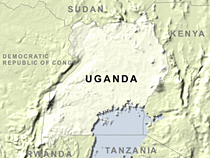-
(单词翻译:双击或拖选)
Nairobi
11 September 2007
The U.S. rights group Human Rights Watch is accusing Uganda's army of widespread abuses in its restive1 northern Karamoja region, including the killing2 of civilians3. As Nick Wadhams reports from Nairobi, Uganda argues that some of the witness accounts were made up.
 |
Human Rights Watch researcher Elizabeth Evenson tells VOA News that the worst atrocities4 have eased in Karamoja but there is no doubt that other armed groups also terrorize civilians. She said people in Karamoja were so afraid of the army that they fled whenever soldiers showed up in their villages.
"In one place where we drove up, all of the women from the village ran away, and when they came back they told us that they had run away because they thought we were the military, they thought we had come in vehicles," said Evenson. "And we did talk to a number of people who would say they had many enemies including other groups in Karamoja and the soldiers, so we did hear comments like that."
Karamoja has been a no-go zone for outsiders for many years. The impoverished5, arid6 region is known for frequent cattle raids by the Karamajong people, as well as drought and general lawlessness.
As part of efforts to bring control to the region, Uganda has launched a disarmament program. But critics such as Human Rights Watch argue that the Ugandan army has often been overzealous in its campaign, and the disarmament sometimes leaves people vulnerable to attack.
Uganda's minister for security, Amama Mbabazi, says the government has had no choice but to get tough in Karamoja because armed groups had acted with impunity7 for years. He denied that the government was guilty of abuses and questioned whether Human Rights Watch had the authority to make claims of atrocities.
"Human Rights Watch, they have no moral right to talk about us and really, to the best of my knowledge they are not qualified8 to talk about Uganda," said Mbabazi. "They sit in the U.S. and start preaching to us and I totally reject that. Our struggle in Uganda is a struggle against violation9 of human rights. That is why I really get angry by these armchair critics who do not know what they are talking about."
The U.N. High Commissioner10 for Human Rights, Louise Arbour, has reported a decline in allegations of rights abuses. Human Rights Watch says while those reports appear to be true, Uganda has refused to hold its soldiers accountable for past crimes.
 收听单词发音
收听单词发音
1
restive

|
|
| adj.不安宁的,不安静的 | |
参考例句: |
|
|
|
2
killing

|
|
| n.巨额利润;突然赚大钱,发大财 | |
参考例句: |
|
|
|
3
civilians

|
|
| 平民,百姓( civilian的名词复数 ); 老百姓 | |
参考例句: |
|
|
|
4
atrocities

|
|
| n.邪恶,暴行( atrocity的名词复数 );滔天大罪 | |
参考例句: |
|
|
|
5
impoverished

|
|
| adj.穷困的,无力的,用尽了的v.使(某人)贫穷( impoverish的过去式和过去分词 );使(某物)贫瘠或恶化 | |
参考例句: |
|
|
|
6
arid

|
|
| adj.干旱的;(土地)贫瘠的 | |
参考例句: |
|
|
|
7
impunity

|
|
| n.(惩罚、损失、伤害等的)免除 | |
参考例句: |
|
|
|
8
qualified

|
|
| adj.合格的,有资格的,胜任的,有限制的 | |
参考例句: |
|
|
|
9
violation

|
|
| n.违反(行为),违背(行为),侵犯 | |
参考例句: |
|
|
|
10
commissioner

|
|
| n.(政府厅、局、处等部门)专员,长官,委员 | |
参考例句: |
|
|
|















